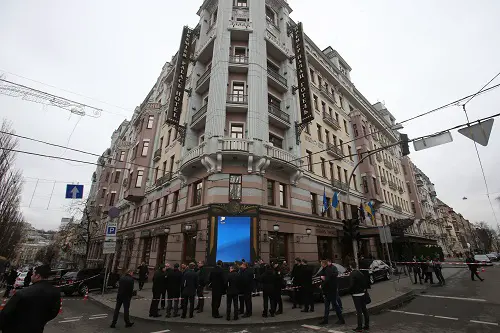The Middle East was already an unpredictable place, and it could be about to become more unpredictable.
Although the Saudis have supported Iran’s enemies such as Saddam Hussein in the past as part of a proxy war strategy, these days they are taking on Iran and its allies in the region directly and on an unprecedented scale. An important reason being that more than ever, the Saudis see Iran as an intractable enemy. This view was reinforced after developments such as foiled plans by Iran to assassinate the Saudi ambassador in Washington in October 2011, as well as ransacking of the Saudi embassy in Tehran in January 2016. This is in addition to being threatened directly by Iran’s supreme leader and most powerful man Ayatollah Khamenei after a stampede in Saudi Arabia which left many Iranian pilgrims dead.
Saudi King Salman bin Abdulaziz Al Saud (right) meets with former Lebanese Prime Minister Saad al-Hariri in Riyadh, Saudi Arabia, on November 6.
The Saudis consider such threats and actions as a serious threat to their national security. They view post-revolution Iran as wanting to undermine them, from Ayatollah Khomeini’s calls for the export of the Iranian revolution to the Saudis soon after coming to power in 1979 until recently through the Houthi rebels in Yemen. Although some place doubt on the extent of Iran’s direct influence over the Houthis, to the Saudis the Houthis are Iran and Iran are Houthis. The fact that the US military recently stated that the missile fired at Riyadh airport "had Iranian markings" seems to have reinforced this view. The Saudis also view the Lebanese Hezbollah group whom they also view as their enemy as being an Iranian proxy.
Saudi Foreign Minister Adel al-Jubeir. /Reuters Photo
However a major and perhaps a more important reason behind the recent increase in the level of Saudi aggressiveness in their dealings with Iran seems to be the rise of Saudi Arabia’s 32-year-old Crown Prince Mohammad Bin Salman, who is also the defense minister. Taking on Iran with unprecedented forcefulness seems to be part of his broader agenda for aggressive reform in the Saudi foreign and defense policy which also includes taking on Qatar, as well as extensive proposed reform in domestic politics.
Iranian Foreign Minister Mohammad Javad Zarif. /Reuters Photo
The implication of this approach will mean that places such as Lebanon will become even more unstable, while finding a solution for Syria could become even more difficult as the Saudis have been known to support some of the opposition groups. Sooner or later, in case of war between Israel and Hezbollah which many in Israel see as inevitable, Israel could expect Saudi political and perhaps even financial support for fighting the Lebanese group.
Those concerned about instability in the Middle East should add another important risk: the possible fall of Mohammad Bin Salman in Saudi Arabia. He is making too many enemies inside Saudi Arabia as a consequence of his broad and unprecedented political and religious reforms. This includes the religious establishment and part of the military establishment after the arrest of numerous princes, including Mutaib Bin Abdullah, the former commander of the National Guard and a favored son of King Abdullah. We have to wait and see how he manages these changes. He could turn out to be one of the biggest revolutionaries in Saudi politics and economy. However, due to the extent of his changes and his increasing number of adversaries inside Saudi Arabia, the risk of his possible eventual downfall and/or serious disturbances within the Saudi royal family remains viable for the time being.
(CGTN)
 简体中文
简体中文





